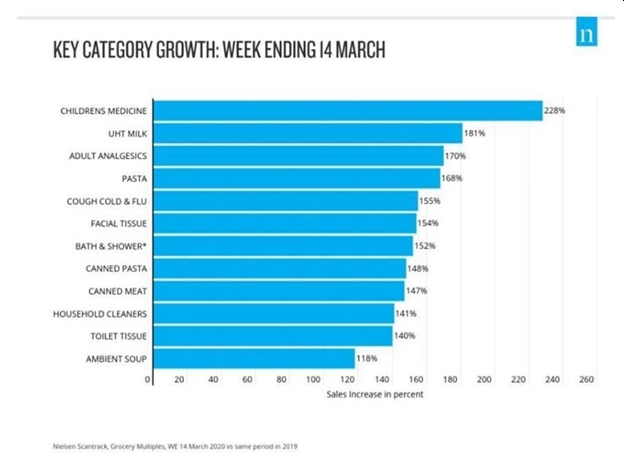Coronavirus Anxiety Drives to Panic Buying
The speedy spread of the coronavirus also known as COVID-19 has sparked alarm worldwide. The World Health Organization (WHO) has declared COVID-19 as a spreading coronavirus outbreak pandemic, and many countries are grappling with an increasing number of confirmed cases. After declaration of COVID-19 as a pandemic the countries advised people to be prepared for disruptions to daily life that will be necessary if the coronavirus spreads within communities.
Introduction to Panic Buying
As in human life the human survival has depended on both fear and anxiety, which necessitate us to react immediately when we encountered a threat, and this what happens in panic buying. According to Tayler panic buying is the anxiety, and the readiness to suppress the fear by going of any lengths, like buying or purchasing the goods more than the need. It is a phenomenon which drives the prices of the goods and creates the shortage of the vital, necessary goods important for the people which show the real-world consequences of panic buying. Panic buying is the action of buying large quantities of a particular product or commodity due to sudden fears of a forthcoming shortage or price rise. Indeed, consumer panic buying associated with disruptive events has been frequently observed, where many consumers buy unusually large amounts of product to avoid possible future shortage. For example, when Hurricane Sandy stroke the New York City in 2012, many consumers rushed to store to purchase unusually large amounts of goods (Bloomberg 2012). Likewise when rice production in Australia reduced by 98% due to a long period of drought in 2008, fears of rice shortages spread around the globe. Regions such as Vietnam, India, and Hong Kong saw consumers rushing to stores and exhausting the rice supply (New York Times, 2008). Amid the earthquake and nuclear crisis in Japan in 2011, worried shoppers stripped stores of salt in Beijing, Shanghai, San Francisco, and other cities (China Daily, 2011). If we move to history, we will find that over epidemic, people attacked the drug stores in Baltimore for the medicines or anything that would prevent and save them from flu and relieve them from the Spanish Flu in 1918. The same happened to a specific case of panic buying of candles in China in 2012 due to a rumor that the earth would fall into darkness for three days when the Mayan calendar came to an end (A Third Paper in the Journal of Intelligence). During the epidemic of cholera, smallpox and many other people showed the same behavior of panic buying. As today the whole world is facing the situation of a pandemic, and after the news about coronavirus and its impact on our day-to-day lives has been in exorable people are again following the same behavior of panic buying. People are stockpiling the products for future consumption with the feeling of uncertainty of getting the things in the future. In current scenario people are worried that that the economic disruptions caused by the COVID-19 will make it problematic to buy essential staples in the near future and that’s why they are stockpiling the essential products for their future driven needs. The UK is not alone where Social media has been flooded with images from across the world of shopping carts lined up at check outs, empty shelves and crazed shoppers carrying six-months’ worth of edible items, sanitizers, toilet paper etc. Just seeing this footage has fed the panic, escalating the problem far beyond anything that was noted during the SARS epidemic when digital connections were far less prevalent. Other nations are too facing the same situation.
Reasons behind Panic Buying
A human behavior expert explains 4 psychological reasons why people are panic buying items in bulk during the coronavirus pandemic
- Over the past couple of weeks, people visiting grocery stores have been met by an apocalyptic sight empty shelf.
- Essentials like toilet paper, pasta, and vegetables have been selling out in supermarkets everywhere.
- This panic buying in response to the COVID-19 coronavirus is due to the brain’s survival mode overriding any rational decision making, according to human behavior expert Dr. Ali Fenwick. He said there are four main reasons for bulk-buying:
- survival mode,
- the scarcity effect,
- herd behavior,
- and seeking a sense of control
Since the COVID-19 virus has spread throughout the world, you’ve no doubt found your local stores sold out of essential items, such as groceries, hand sanitizer, masks and many food products. The given US example indicates that panic buying in disaster situations is driven primarily by the fear that there will be a shortage in the future.

This graph shows that in the case of fear the consumers goes for panic buying so as to manage the future needs. Instituting quotas on items in high demand is one of the effective ways to manage resources in case of stockpiling and to avoid the risk in future.
Some of the possible remedies of Panic Buying
- You should start by taking stock of the items you already have at home, and how long they will last.
- When stocking up, it’s important to limit waste and be considerate. It’s not helpful to buy food that spoils, or buy so many products that others, including the elderly, experience hardship. Buying any item is useless if it takes a year to use them.
- Food waste can be limited by developing meal plans for the next two to three weeks, keeping in mind when certain products expire. By focusing your attention on what you will realistically use during this time, you can make more informed decisions about what to buy.
- When shopping, take a list with you to guide your purchases, and try your best to stick to it. This way, you’ll be less likely to succumb to anxiety-driven purchases triggered by the sight of empty shelves, or thoughts of supermarkets closing. That said, be willing to buy substitutes if certain items are sold out. You can plan for this in advance.
Author –
Dr.Deepmala Singh
Assistant Professor
LBEF Campus

